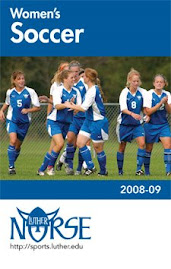Since this is my last blog, I thought I would just reflect about the overall experience of the class. This class has been one of my favorite classes that I have taken at Luther. One reason I can tell this is true is because I hardly ever find myself looking at the clock while sitting in class! The discussions and chosen topics have been relevant and important. I really enjoyed writing papers that gave the students a lot of choice. It was refreshing to be able to write response papers and give opinions about specific issues that matter to the individual. I hope that in the future, I will be teaching at a school that fosters this type of professional dialogue about the philosophy of education and some of the key ideas surrounding education.
The only thing that I think could have improved the class is if somehow there were more students not majoring in education. I really enjoyed hearing the thoughts and opinions of the students who aren't bogged down with all the "politics" and redundancy sometimes felt by students in the education department. This may help take away from the feeling that PCAP U.S. Schools is "just another ed. class". Hopefully students who are not in the education department would not feel intimidated, but that they would speak up and share their opinions. I think it is important to get outside opinions from those who aren't jaded from all the "education talk". This is something that I believe all teachers should be doing more consistently. Although I think it is very important for colleagues to discuss big ideas in education on a regular basis, I also think it would be beneficial for those outside of the profession to be able to bring new clarity and insight to issues. Sometimes it is necessary to step back and do things differently. We have discussed some big issues in education throughout the semester in PCAP and it has inspired me and made me more excited to get into the classrooms and start making a difference. Hopefully in the years to come, young educators will be able to help reform our current education system in the U.S. and bring fresh ideas and the enthusiasm that is necessary for big changes.
Final Thoughts
15 years ago

